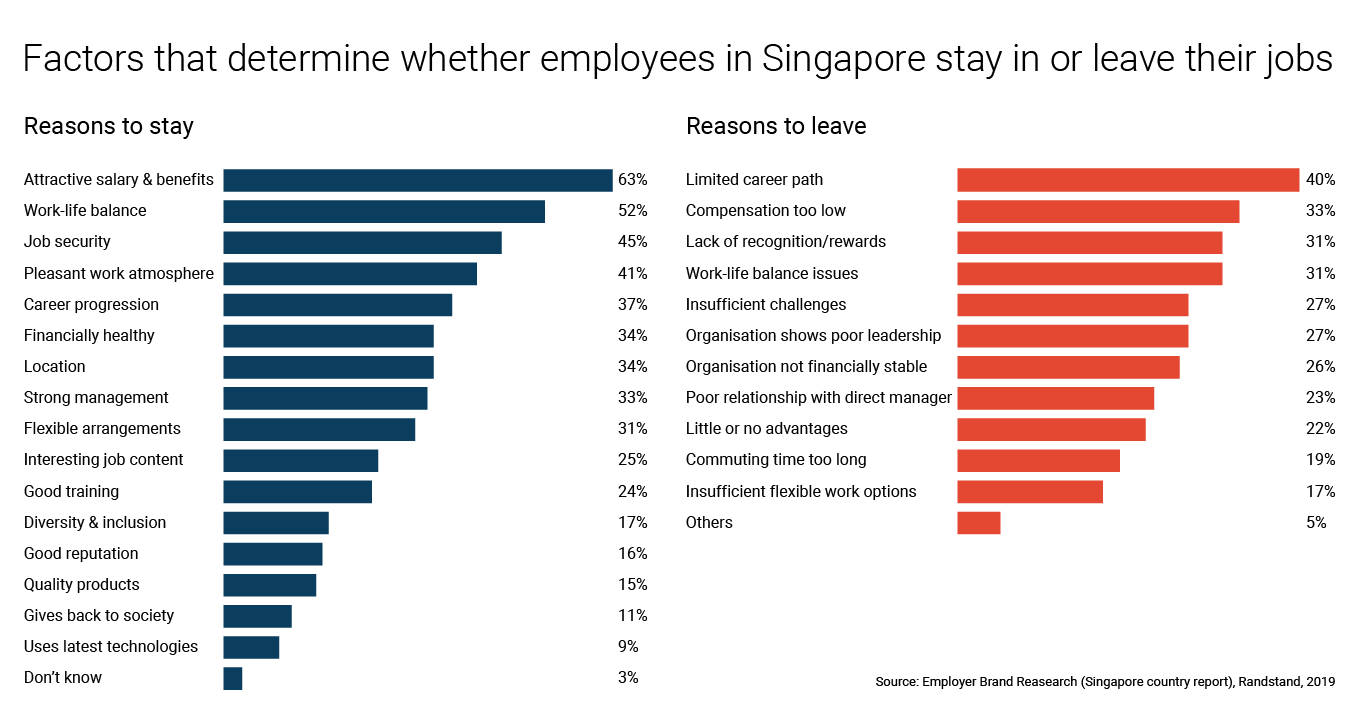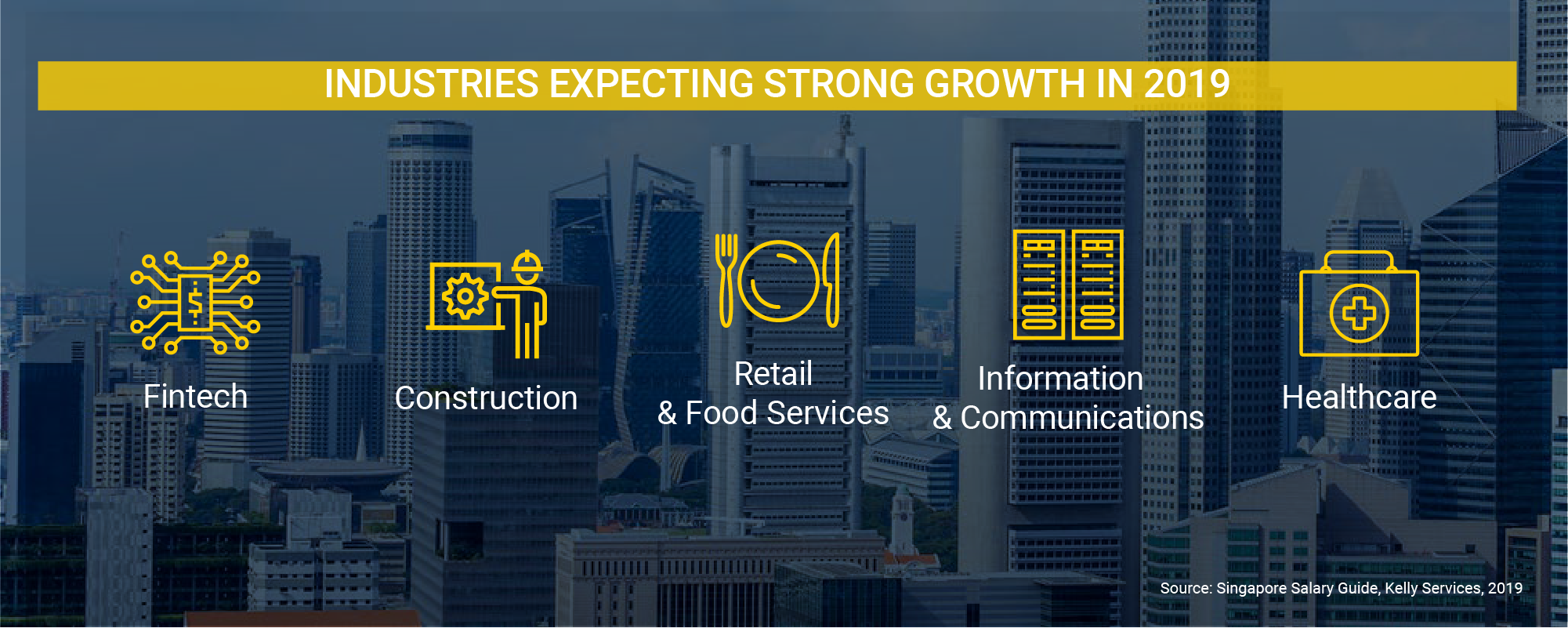3 Questions to Ask Before Making a Career Switch

Starting a new career begins with asking yourself these 3 questions
If you find yourself toying with the idea of making a career switch, you are not alone. According to Business Insider, 2 in 5 Singapore workers plan to leave their jobs in 2019.
To corroborate this finding, Randstad (a Human Resource solutions agency) revealed in an Employer Brand Research Study Report on 19 June that “39 per cent of Singaporeans intend to leave their current companies this year.”
This is quite a significant figure given that the looming economy and job prospects do not look too rosy. To get a clearer picture, Randstad provided a statistical breakdown of why employees would want to seek greener pastures elsewhere:
Whether or not your reason(s) for leaving falls into any of the above categories, taking the plunge to make a career transition requires deep reflections, courage and guidance along the way. The journey can be rather daunting especially for those who are trying to make a drastic career switch, for example, from being a teacher to a mobile app developer.
On top of that, unlike recent graduates who most likely had pursued careers related to their studies, mature workers (40 years and above) are sometimes subjected to negative stereotypes such as being resistant to adapt or reluctant to take orders from younger colleagues.
According to the Managing Director of Hays Singapore, Lynne Roeder, “Employers may harbour the perception that older workers may be slower to pick up new skills and are less productive than younger workers.”
Involuntary career switch
While some of us may aspire for better job opportunities voluntarily, others may face roadblocks in their career and change is inevitable, especially for those working in sunset industries. Workers can be retrenched as businesses cut costs or fail, displacement can also arise from tech advancements (replaced by Artificial Intelligence or Robots) or economic restructuring.
Whatever the impetus it is for a career switch, here are some questions to ask yourself to ease your transition journey:
1. Before making a career switch, ask yourself: what are your professional goals?
If you knew exactly what you wanted to make a career change, the pathway to a new profession is much clearer. However, some of us may not know what it entails to make that change.
To guide you through the uncertainty, a career guidance workshop can help to steer you in the right direction before embarking on a career switch or job hunt.
Such workshops usually bring participants through a profiling tool, which will help them uncover their values, interests, personality and skills.
To make sense of their profiling test results, participants can consult with the workshop facilitator in order to translate the results into realistic career and upskilling goals.
An example of a career guidance workshop is the Career Navigator, organised by e2i (Employment and Employability Institute), which was crafted to provide participants with a sense of direction.
Ms Brenda Tung, an Employability Trainer with e2i, explains that “many of those who attended the Career Navigator workshop often feel lost and need a helping hand to make their career change, while other participants just want to be sure that they are on the right track to make that desired transition.”
One of the Career Navigator participants is Kayne Kwa, 40, a degree holder who took the plunge by engaging the help of e2i after months of futile search for a full-time job last year.
“I sent a number of resumes and used many job search portals without any success. This had affected my confidence and I questioned if I had any relevant and employable skills or experience at all.”
The turning point came when Kayne attended Career Navigator in February 2019. The workshop leverages on the RIASEC profiling test that is accessed through the MySkillsFuture portal account. After getting their test results, workshop participants are encouraged to set their career goals.
Initially, Kayne did not have much expectations other than to understand how he could use the MySkillsFuture portal to better chart his career direction.
“To my pleasant surprise, I gained so many valuable insights that day,” he said.
Career Navigator participants also benefit from consultations with the trainer at hand. With the help of Andre Cheong, an e2i Associate Employability Trainer, Kayne did a psychometric test which can be found in the MySkillsFuture portal.
“Using the assessment tools available, Andre facilitated an engaging session and enabled me to discover my strengths and interests,” Kayne recalled.
The results of the psychometric test helped Kayne gain more insight into his career values and interests. He also took the opportunity to reflect on his professional goals to take better ownership of how he wants to chart his career path.
Not only meant for those who are looking for a career change, the psychometric test can also be done by fresh graduates who want to discover their career goals, values and interests which can further direct them on the right career track.
2. Which industry should you consider switching into?
Research is always a good starting point when considering a move into a new industry. You can easily begin by talking to your friends and family who work in different fields, visiting career fairs and finding out as much as you can about various industries online.
It is also advisable to be up to date about current hiring trends. Earlier this year, Kelly Services highlighted that the industries that will see the strongest growth in 2019 are:
- Fintech;
- Construction;
- Retail & Food Services;
- Information & Communications, and;
- Healthcare.
Once you have decided what your desired job is, the next step is to find out the skills required to get your foot in the door.
3. How to pick up new skills for your new career?
After you have identified the industry which you would like to join, make a list of the relevant skills you need to get that job. Next, lay the groundwork by seeking courses which will help you to fill the skills gaps, expand your network or opt for an internship to familiarise yourself with the industry.
If the process sounds a bit tedious for you, why not rely on the Skills Framework? Co-created by employers, industry associations, education institutions, unions and the government for Singapore’s workforce, it is an integral component of the Industry Transformation Maps (ITMs).
ITMs provide key information on sector, career pathways, job roles, as well as existing and emerging skills required for these roles. In addition, there is also a list of training programmes for skills upgrading and mastery.
In addition, the Skills Framework helps to facilitate skills recognition and support the design of training programmes for career development. It is suitable for those who need to make informed decisions on education and training, career development and skills upgrading.
As much as it is important to arm yourself with new skills to make a career switch, employers also place value on soft or social-emotional skills such as communication, leadership, critical thinking, problem-solving, management and creativity. Even if you have made a career transition, these skills are portable and critical to thriving in a workplace.
As Harvard University’s Professor David Deming puts it, “If you really want to ensure relevance in the future, social skills are a much stronger predictor of future employment and wage growth than cognitive skills. Social emotional skills combined with technical competencies make for an upwardly mobile workforce.”
Making a career transition takes time, effort and careful planning. From making a drastic decision to switch careers which requires soul-searching, to equipping oneself with the necessary skills in order to venture into a new sector, the entire process can be an uphill task (especially for those who have family commitments or who have to juggle both work and studies).
Ask yourself these questions and seek help from career guidance professionals and workshops like Career Navigator that can guide you towards better awareness in achieving your career goals.
By Zann Huizhen Huang






